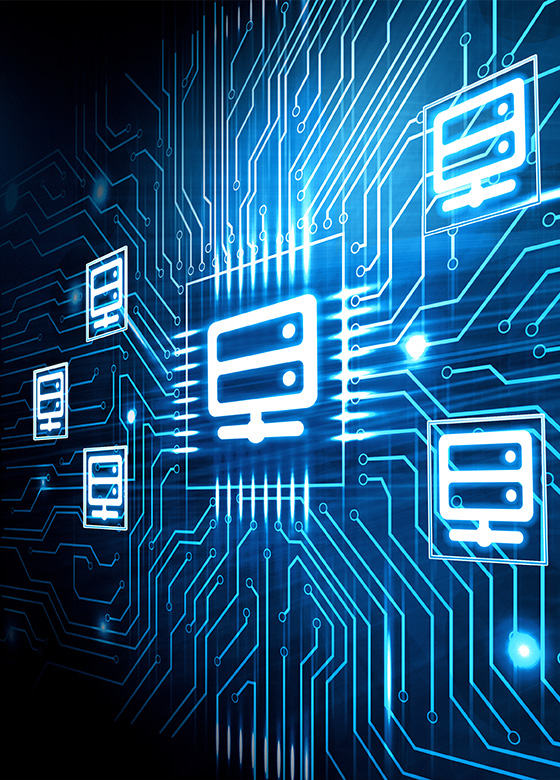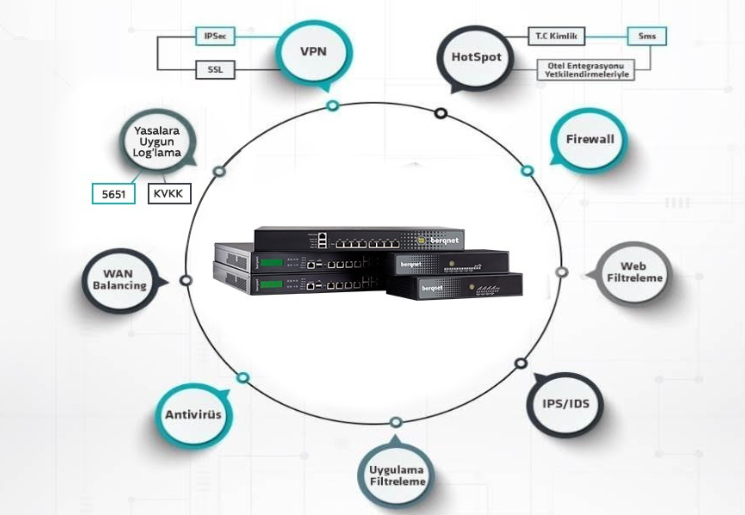Firewalls are firewall systems for computer systems. Firewall devices are physical products that are produced by combining these software with appropriate hardware.
Firewalls, or firewall systems, control all incoming and outgoing network traffic, passing it through certain filters and aiming to stop harmful actions in network traffic. It is a security mechanism that protects your devices and computers on internal networks or networks against attacks from other networks (internet) and controls network traffic between internal and external networks according to certain rules. Firewall systems are divided into two as hardware and software based. Software-based firewall applications are usually installed on operating systems on clients or servers. Hardware-based firewall devices are systems that run on specialized hardware. Firewall systems are divided into two as hardware and software based. Software-based Firewall applications are usually installed on operating systems on clients or servers. Hardware-based firewall devices are systems that run on specialized hardware.
Call Now:
+90 539 583 3874-
0532 385 02 17


In the space age we live in, firewall devices have evolved is presented as a complex solution. UTM (Unified Threat Management), called "Unified Threat Management" security devices, which we call security devices firewalls. Now these firewalls IPS, IDS, Web Filtering, Application Filtering, Hotspot, VPN, 5651 Log Management is also available with features such as is coming.
UTM (Unified Threat Management) Firewalls Viruses, trojans, spam and similar attacks have rapidly increased and become more complicated. The widespread use of the Internet allows these malicious applications to increase. On the other hand, the use of employees' networks outside of work has also shown parallelism. Users within the company connect to networks outside of work and are exposed to malicious activities through networks such as Whatsapp and Facebook. For this reason, SMEs and large companies started to use firewall devices that we call UTM for their security. As it becomes more difficult to control users and the types of cyber attacks increase, unknown threat management has become mandatory for security. However, in general, we have to turn to integrated devices that block all threats. Integrated Security Appliances are a growing trend in the firewall market. For this purpose, many brands are launching "Unified Security Systems" (UTM) products that can block all threats on a single device. It has started.



Hardware firewall devices are security devices integrated into routers and similar hardware. They typically use packet filtering and analyze incoming and outgoing traffic by creating a bridge between your internal network and the external network (internet). They do not affect the performance of your system or the speed of your servers as they operate as separate hardware without being installed on existing servers or systems. It is an efficient option for all organizations using broadband. Also software
They cannot be easily disabled like firewalls. Since you can secure your entire network with one device, it significantly reduces costs. However, their prices can increase significantly depending on their usage areas and features. Hardware firewall settings can be quite difficult for new non-professional users. However, at this point, new generation Firewall devices and UTM devices eliminate this disadvantage with their management panels with easy interfaces.
Software firewall products can run at the application layer on operating systems. This type of firewall can be easily installed as software on any computer. They check whether the data coming into the computer is the desired data and can often be set up so that the data leaving the computer can also be checked. Their cost is quite affordable compared to hardware firewall products. It is an ideal choice in places with a small number of computer networks. They are simple to install and use and allow you to adjust your security level with a few simple clicks. However, since they run on operating systems, they are a burden on the server. On the other hand, they are easy to disable and can pose security risks if they are managed by users. While firewall protects us against external events, how can we increase our own security by taking precautions against internal events? What can we do in this case?


Firewall devices offer a network-wide security solution while anti-virus programs offer a system-wide solution Firewall can analyze network traffic and detect malicious packets transmitted on the network, while anti-virus software can only detect malicious packets arriving on the system on which it is installed. Firewall cannot detect the threat because it cannot read encrypted traffic containing malicious connections, while anti-virus software can detect the malicious connection to the system by performing behavioral analysis. In summary, while firewall is a security product that analyzes the traffic coming in and out of the system, anti-virus software is a security product that detects anomalies throughout the system. For example, you can detect a malware that infects your system via USB with anti-virus software while you cannot detect it with a firewall. Therefore, firewall and anti-virus software are two different security solutions that complement each other. What and how can we provide protection in our internal security in our network structure? Are antivirus programs sufficient? Which antivirus programs would be healthier to use? Should we prefer Cloud Based?
Computer viruses should not be confused with viruses in medicine. Although they are different structures, they have commonalities in their nature. Both viruses enter the system and cause damage. Computer viruses are pieces of malicious code that make changes to the system without the user's permission, to steal data from the system or to make the system completely unusable. While malware is the main category that includes viruses, viruses are divided into self-replicating viruses and self-executing viruses. Self-replicating viruses are often confused with worms. Replicating viruses, like worms, spread over a network from one machine to another. However, they differ from worms in that they need a carrier structure to spread. Self-executing viruses are viruses that inject their execution code into programs that need to run continuously, such as programs in the startup folder.
